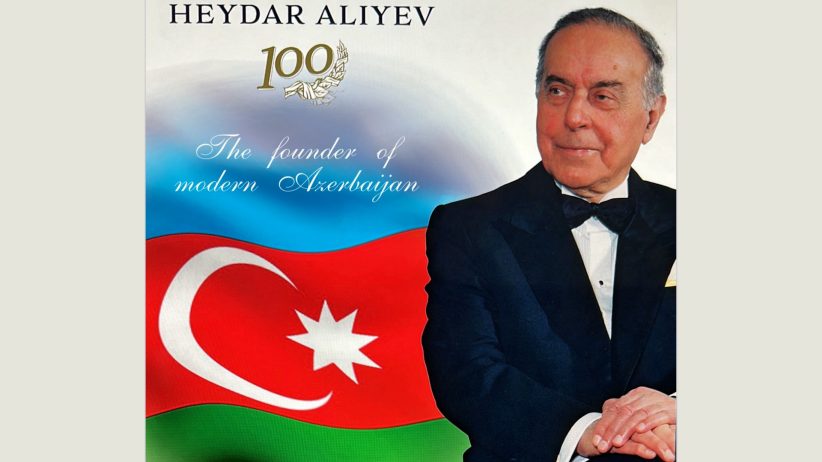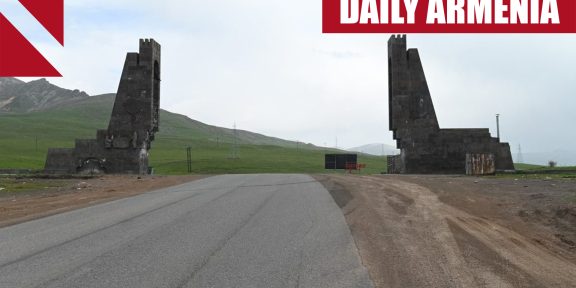by Paul Vartan Sookiasian
Quotes attributed by Azerbaijan’s official news agency to speakers at a workshop held last month in Utah dedicated to the “historical legacy of Heydar Aliyev” appear to have been completely fabricated. The workshop on the KGB agent turned post-Soviet strongman was organized by Dr. M Hakan Yavuz of the University of Utah through its Turkish Studies Project, which was established by a grant from the lobbying group the Turkish Coalition of America. It came just two months after Aliyev’s son Ilham, who succeeded his father in the presidency, orchestrated the violent ethnic cleansing of the entire Armenian population of Nagorno-Karabakh, which he has celebrated as a fulfillment of his father’s legacy coinciding with his 100th birthday. An article about the workshop in the Azerbaijani state news agency AZERTAC quoted from the presentations of two University of Utah political science professors who took part which were condemnatory of Armenians and celebratory of Heydar Aliyev as a leader. However, both professors have confirmed to CivilNet they made no such statements. This is just the latest example of the state news agency being accused of manufacturing statements from experts, journalists, and academics as a means of promoting official government narratives.

According to the article, Professor Marjorie Castle’s presentation “examined the Soviet and communist legacies in different states… [and] concluded that Azerbaijan, as well as Armenia itself, paid a heavy price because of the irredentist and radical Armenian nationalism.” When reached for comment about the statement, Professor Castle replied “I did not say anything even close to this. My talk was about the legacies of communism in general. I did not mention Armenia even once.” In addition, she disputed how the article described the other aspects of her presentation, such as how it claims she compared nationalism in the Baltics and the Caucasus, when in fact according to her she never discussed either region, nor even mentioned the word nationalism.
It appears that the section about the presentation by another member of the political science department who took part, Professor Steven Lobell, has been removed from AZERTAC’s article in recent days; however it is still included in a reprint by the outlet Xalq Qazeti. Lobell was described as having “treated the Caucasus as a civilization Faultline and argued that Heydar Aliyev had much [sic] prudent and pragmatic foreign policy. He focused to [sic] consolidate the state power. In the end, his project prevailed and Azerbaijan freed its territories and became the most stable state in the Caucasus.” In response to CivilNet, Lobell confirmed “the words below are not mine. I did not say them, speak them, suggest them, or imply them. No, I never mentioned his [Heydar Aliyev’s] name or made any reference to him.”

The author of the Utah workshop article, special correspondent Vugar Seyidov, is a sometimes-political analyst whose English language articles are mainly about Azerbaijani events abroad. He participated in June’s Shusha Global Media Forum, which was heavily criticized for various reasons. First, because press freedom is practically unknown in Azerbaijan. And perhaps more egregious, its indulgent atmosphere was on display while just miles away the beleaguered and blockaded Armenian population in Nagorno-Karabakh went without food. Seyidov spoke on a panel about “the safety of journalists” alongside Azerbaijani MP Nigar Arpadarai, who is known for being one of the Aliyev regime’s most active anti-Armenian propagandists on Twitter. Seyidov attracted attention back in 2009 for his own comments, when he floated the idea of Azerbaijan completely destroying Armenia by blowing up its Metsamor nuclear plant using kamikaze pilots. This idea has continued to circulate for years since, including just prior to Azerbaijan launching the 2020 Karabakh War when its Defense Ministry warned it could cause a “huge disaster for Armenia” by striking Metsamor with one of its high-precision missiles, its multi-billion dollar arsenal having outgrown the need for kamikaze pilots.

The Utah workshop enjoyed the direct involvement of the Azerbaijani government, concluding with a speech by Consul General of the Republic of Azerbaijan to Los Angeles Ramil Gurbanov. He succeeded now-Ambassador to Germany Nasimi Aghayev, whose time in Los Angeles was marked by his virulently racist anti-Armenian screeds. He was regularly accused of being behind a host of “sock-puppet” Twitter accounts purporting to represent various Azerbaijani organizations and western experts which had scant evidence of actually existing. Multiple requests to the Consul General and the consulate for comment about its involvement in the workshop, including whether it financially sponsored the event and how the apparently false quotes found their way into the state news article, received no reply. AZERTAC also did not respond to requests for comment. When asked, a representative of the University of Utah’s Political Science Department deferred all questions to the organizer Professor Yavuz, who did not reply to multiple requests.
Not all quotes in the article were contrived however. Dr. Michael Gunter of Tennessee Tech and Dr. Ali Askerov of the University of North Carolina-Greensboro both confirmed to CivilNet that the descriptions of their presentation appeared to be accurate. Gunter’s talk compared Heydar Aliyev favorably to two of history’s greatest leaders, Abraham Lincoln and Charles de Gaulle, while Askerov who spoke on “Heydar Aliyev and the Evolution of Azerbaijan’s Oil Politics”. Thus it appears favorable mentions stayed in Seyidov’s article, but where they were absent, desirable quotes were created.
This is not the first time AZERTAC has been accused of fabricating quotes to promote the state’s interests. In March, Reporters Without Borders (RSF) reported on Spanish journalist David López Frias’s visit to Azerbaijan and the Lachin corridor, which at that point was four months into the Azerbaijani government’s total blockade of Karabakh’s 120,000 population. López had been accompanied by “guides” from the state-owned Global Media Group, and was freely allowed to interview the state-organized protesters blocking the road, but was unable to meet with any Armenians or Russian peacekeeping forces. AZERTAC then published an interview with the visiting journalist in which he is quoted as saying “Vehicles pass here without any problems. You just see people demonstrating to protect nature”, matching the state’s official line on the blockade at the time. However, as López told RSF, “I said the exact opposite. I clearly saw a blocked road.” RSF condemned AZERTAC’s “barefaced lied”, calling it “further evidence of a desire on the part of the Azerbaijani authorities to manipulate national and international public opinion”. This tactic of creating positive press has also been widely utilized on recent state-sponsored free trips to Azerbaijan. Travelers have reported fake quotes being attributed to them by Azerbaijani media outlets and feeling pressured by reporters to repeat specific talking points to be utilized in propaganda articles.
Last month’s Heydar Aliyev workshop is part of a much wider web of connections between Azerbaijan and the state of Utah. Part two of this article will explore Azerbaijan’s inroads into the highest levels of state government and the Church of Jesus Christ of Latter Day Saints (the Mormon Church), as well as the central role the University of Utah has played in attempting to legitimize academic discourse denying the 1915 Armenian Genocide through the decades-long work of Dr. Yavuz.
















